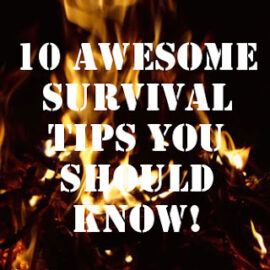Outdoor Survival Skills: 10 Essential Tips

Survival in the great outdoors requires preparation, knowledge, and the right skills. Whether you’re an avid hiker, camper, or adventurer, understanding key survival tips can make the difference between a great story and a dangerous situation. Here’s a comprehensive guide to outdoor survival skills that will ensure you’re ready for anything nature throws your way.
1. Prepare and Plan Ahead
Preparation is your first line of defense against outdoor emergencies. Before embarking on any adventure, research the environment and weather conditions you’ll be facing. Create a detailed itinerary and share it with someone who can raise the alarm if you don’t return on time.
Essential Survival Gear:
- Navigation tools: Maps, compasses, GPS devices.
- Clothing: Appropriate for the weather.
- Backpack: Reliable and sturdy.
- First Aid Kit: Well-stocked with bandages, antiseptics, and medications.
- Food and Water: Sufficient supplies for the duration of your trip.
- Multipurpose Knife or Multitool: For various tasks.
- Emergency Shelter: Lightweight tent or tarp.
- Fire-Starting Tools: Waterproof matches, lighters.
- Lighting: Flashlight or headlamp with extra batteries.
- Communication Devices: Charged cell phone, whistle, two-way radio.
2. Master Navigation Techniques
Getting lost is a leading cause of outdoor emergencies. Familiarize yourself with maps, compasses, and GPS devices. Learn basic orienteering skills such as taking bearings, following compass headings, and triangulating your position. Always use natural landmarks and celestial navigation as backup methods.
5 Clever Ways To Find North Without A Compass
3. Build a Shelter
A good shelter protects you from the elements and conserves body heat. Identify suitable locations with natural protection, avoiding low-lying flood-prone areas and potential hazards. Construct different types of shelters based on available resources, like debris huts, lean-tos, or snow caves. Insulate your shelter for warmth and protection.
4. Find and Purify Water
Water is essential for survival. Locate water sources by looking for signs such as vegetation, animal tracks, and the sound of running water. Always purify water before drinking to avoid illness. Methods include boiling, using water filters, chemical treatment, and UV sterilization.
5. Make Fire
Fire is crucial for warmth, cooking, and signaling for help. Gather appropriate materials like dry twigs, leaves, and small branches. Master different fire-making techniques, including friction-based methods (like a bow drill), flint and steel, solar ignition, and using fire starters.
9 Ways To Start A Fire Without Matches
How To Start A Fire In Wet Weather
6. Secure Food and Forage
Knowing how to find food can be vital. Learn to identify edible plants, berries, and insects. Basic trapping and fishing techniques, such as deadfalls, snares, and simple fishing lines, can provide sustenance. Always understand the importance of food safety in the wilderness to avoid illness.
7. Outdoor Survival First Aid and Medical Skills
Carry a well-equipped first aid kit and know how to use it. Essential items include adhesive bandages, sterile gauze pads, antiseptic wipes, tweezers, scissors, and pain-relieving medication. Learn to treat common injuries like cuts, burns, sprains, insect bites, and allergic reactions, and understand how to manage medical emergencies in remote locations.
8. Wildlife Awareness and Safety
Educate yourself about local wildlife and their behavior. Prevent wildlife encounters by keeping a safe distance, storing food properly, making noise while hiking, and disposing of waste properly. Knowing how to react during an encounter can prevent serious situations.
9. Signal for Help
Knowing how to signal for help can save your life. Understand distress signals such as shouting, blowing a whistle, creating visible signals, and using smoke or a flashlight. Use signaling devices like a mirror, whistle, or personal locator beacon (PLB) effectively to attract rescuers’ attention.
10. Maintain a Positive Mindset
Survival is as much mental as it is physical. Maintaining a positive mindset can significantly impact your ability to make rational decisions and stay motivated. Stay calm, stay focused, and keep a positive outlook, even in challenging situations.
Conclusion
Outdoor survival skills are essential for anyone who loves venturing into nature. By preparing adequately, mastering essential techniques, and carrying the right gear, you can ensure a safe and enjoyable adventure. Remember, the key to survival is knowledge and preparedness. Stay safe and happy adventuring!
By incorporating these essential tips and ensuring you’re well-prepared, you can confidently tackle any outdoor adventure and turn potential emergencies into manageable situations.

